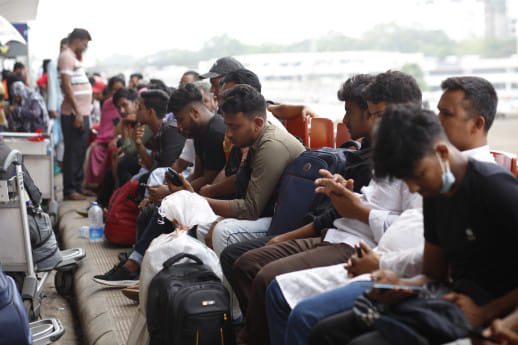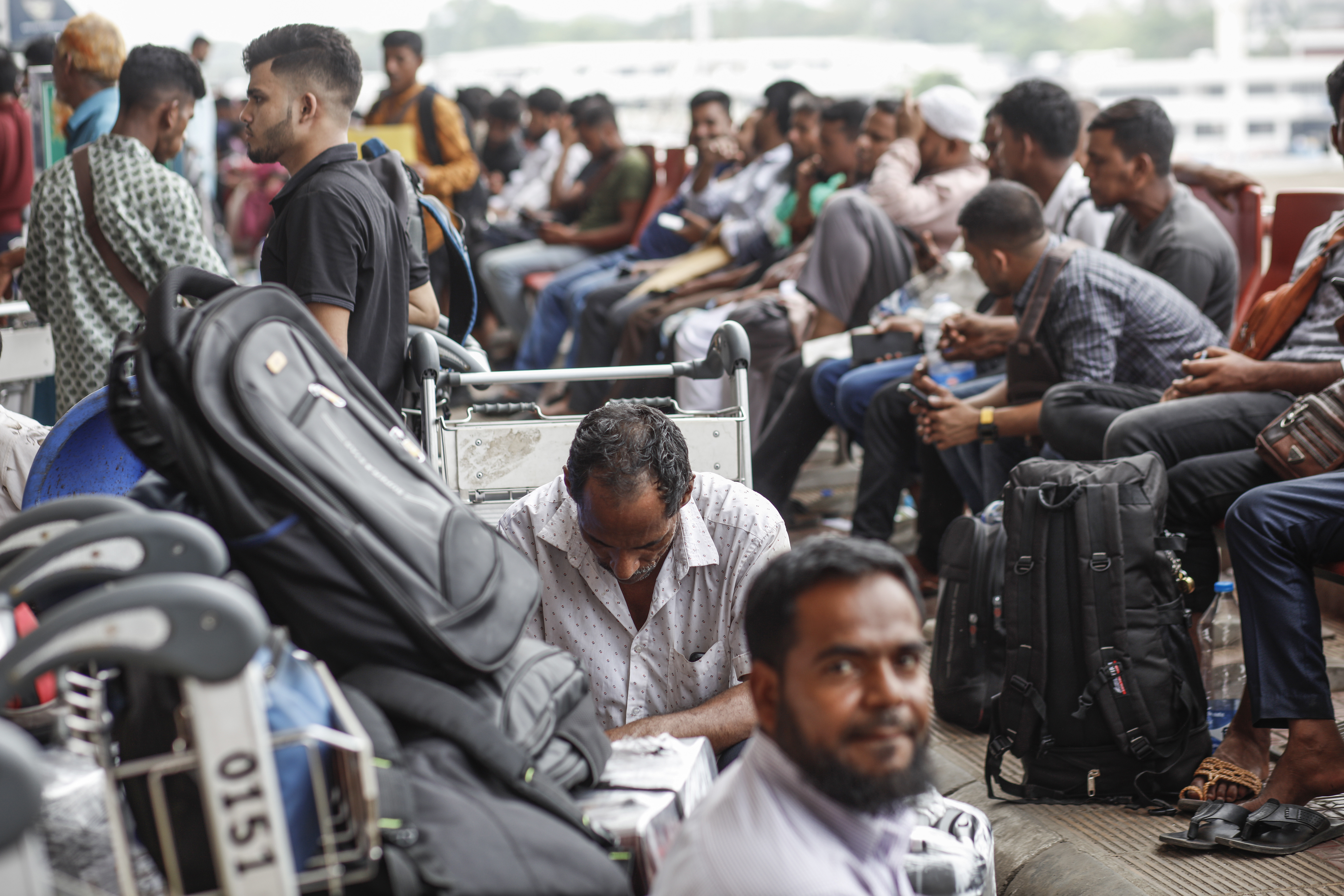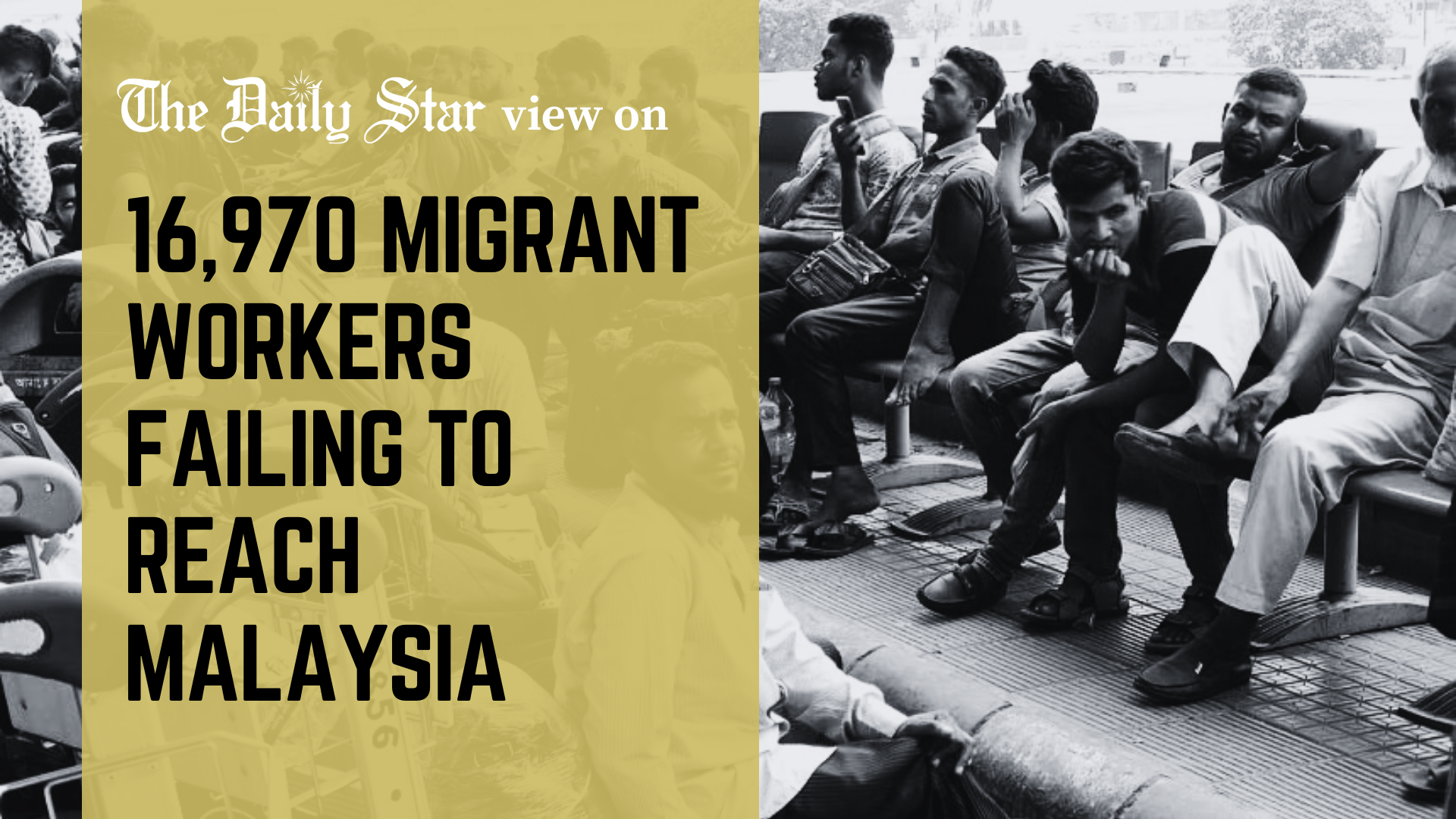Actions, not slogans, are needed for migrant workers' welfare

Around 18,000 aspirant migrant workers could not fly to Malaysia this year before the May 31 deadline, when Malaysia closed its doors to Bangladeshi workers. Many paid lakhs of taka to recruiting agencies and received emigration clearance but failed to get a ticket due to mismanagement by the recruiting agencies and government authorities.
Even though the government instructed recruiting agencies to refund the money to the aspiring migrant workers by a set deadline, which was revised three times, none of the workers have been reimbursed yet.
In October, during his visit to Dhaka, Malaysian Prime Minister Anwar Ibrahim promised that the migrant workers who failed to meet the May 31 deadline would be given priority when the country reopens recruitment of Bangladeshi workers. Yet, nobody knows when this will happen.
Over the past four decades, Malaysia has repeatedly shut down its labour market because of various irregularities, corruption, and syndicates. The last time the country resumed hiring Bangladeshi workers was in 2022. According to a survey conducted by Verite Incorporated and four other companies (May 2023), the syndicate charged an average of Tk 5,44,000 per worker instead of the government-specified cost of Tk 79,000. Allegations have been raised that Tk 1,07,000 has been taken as a syndicate fee from each worker, and approximately Tk 50 billion has been laundered in this way. Moreover, Tk 37.5 billion has been laundered in the name of visa trade.
Such irregularities have constantly raised the cost of migrating to Malaysia. In fact, the migration cost from Bangladesh is almost the highest in the world for most destinations, while the earnings of our migrants remain among the lowest. A 2020 survey by the Bangladesh Bureau of Statistics and ILO found that the average migration cost for a Bangladeshi was Tk 4.17 lakh, requiring a migrant worker to work for 18 months to recover the cost.
Though the government has fixed the migration cost to 14 countries at a maximum of Tk 1.66 lakh, job seekers often had to pay six times higher because of bribes, corruption, visa trading, and intermediaries at every stage. Despite the high costs, people are desperate to go abroad. Nearly one million Bangladeshis have already gone abroad this year, compared to 1,305,453 last year, a record for the last 53 years.
Like last year, Saudi Arabia (KSA), Malaysia, Qatar, Singapore, and Kuwait have been the top destinations for Bangladeshis in 2024.
A 2018 IOM report data shows that over 12 million Bangladeshis have gone abroad in the last four decades. In the last fiscal year, they sent approximately $22 billion with the highest amounts coming from UAE, USA, UK, KSA, and Malaysia.
According to a 2022 International Organization for Migration report, Bangladesh is the sixth-largest labour-sending country and the seventh-largest in terms of earning remittance. But despite such contributions, are Bangladeshi migrants getting the respect they deserve?
The answer is no; instead, they are harassed while getting a passport, completing medical check-ups, paying for tickets, etc. After facing all these barriers in the country, when a migrant finally reaches their destination, they are often exploited. They are given low or no salary, inhuman workload, and are made to live and work in dire conditions, which even results in death.
Last year, a record 4,552 Bangladeshi workers died abroad, with a majority in Gulf states. According to Wage Earners' Welfare Board (WEWB), Bangladesh received more than 50,000 corpses of migrant workers since 1993. Also, nearly one million migrants have returned as deportees almost empty-handed in the last 15 years. This year, nearly 85,000 have already returned, with half of them deported from KSA, according to airport sources.
Many of them endured physical injuries and mental torture, while many women migrants were sexually exploited, leading to severe trauma. To mitigate these challenges, the government can consider establishing standard operating procedures (SOPs) at the airport and setting up welfare desks and lounges for migrant workers in the new third terminal.
Besides, a more comprehensive reintegration service is essential for the returnees. However, high migration costs—fees paid to intermediaries and recruitment agencies by migrants—being the main problem, should be addressed first. Promoting and developing online platforms can reduce dependency on intermediaries, cutting down costs for workers. End-to-end digitalisation of services (e.g. throughout the life cycle of migrant workers) can also be a solution for ensuring transparency.
Focus should be placed on sending skilled workers instead of unskilled or semi-skilled workers. Two million people have gone to KSA in the last four years, but the remittance has decreased by almost two billion. So, skill and better migration governance should be prioritised rather than numbers.
The government can also upgrade its training centres to provide sector-specific skills based on labour market needs abroad in collaboration with private institutions. Emerging sectors such as technology, healthcare, care economy, and engineering should be more focused on.
Proper information and services are still a challenge at the grassroots. Migrant workers and their families often lack accurate and reliable information about the migration process and this makes them more vulnerable to exploitation and the risk of trafficking or irregular migration. In fact, in 2024, Bangladesh has once again emerged as the top country for migrants undertaking risky sea journeys to reach Europe, surpassing war-torn nations like Syria, which is a shame for Bangladesh.
To raise awareness against this, the government can conduct nationwide awareness campaigns, particularly in rural areas. Making formal migration pathways more accessible and affordable will help curb irregular migration by giving workers safe and legal options.
While the government has indeed taken various positive initiatives in the field of migration, there is still a long way to go. The Ministry of Expatriates' Welfare and Overseas Employment should lead and ensure that the Wage Earners Welfare Board's fund management is transparent, BMET is corruption-free and Bangladesh Overseas Employment and Services Limited and Probashi Kallyan Bank more effective in serving millions of migrants every year.
It is also important to remember that migrants are not just money-making machines; they are human beings who deserve dignity and better care, which we often forget as they don't have voting rights. Most countries around the world now provide voting rights to their expatriates. Yet Bangladeshi expatriates, who make up a significant portion of the country's voting population, do not have the right to vote.
The irony is felt more today as the world observes International Migrants Day to recognise and celebrate the contributions of millions of migrants and protect their rights. This year, Bangladesh is observing this day along with National Expatriates' Day. The slogan for this year is, "Migrants' rights are our commitment; discrimination-free Bangladesh belongs to all." It's a good slogan, but we see good slogans every year rather than actions. The concerns for migrants and the actions taken should not be limited to just one day. Rather, our real unsung heroes should be celebrated every day, both within the country and abroad.
Shariful Hasan is associate director of BRAC Migration Programme and Youth Platform and a columnist.
Views expressed in this article are the author's own.
Follow The Daily Star Opinion on Facebook for the latest opinions, commentaries and analyses by experts and professionals. To contribute your article or letter to The Daily Star Opinion, see our guidelines for submission.




 For all latest news, follow The Daily Star's Google News channel.
For all latest news, follow The Daily Star's Google News channel. 


Comments